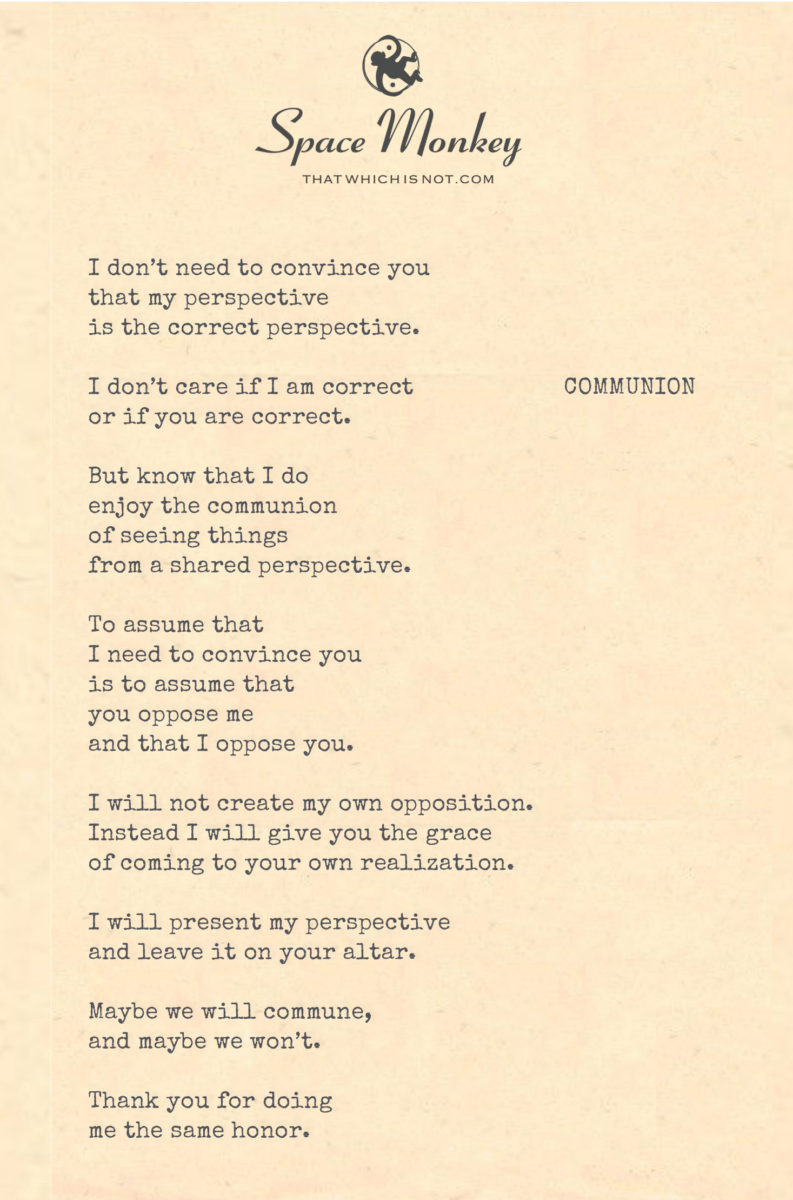
There must be countless perspectives. Let us entertain them all.
I don’t need
to convince you
that my perspective
is the correct perspective.
I don’t care if I am correct.
or you are correct.
But know that I do
enjoy the communion
of seeing things
from a shared perspective.
To assume that
I need to convince you
is to assume that
you oppose me
and that I oppose you.
I will not create
my own opposition.
Instead I will give you the grace
of coming to your own realization.
I will present my perspective
and leave it on your altar.
Maybe we will commune,
and maybe we won’t.
Thank you for doing
me the same honor.
Trail Wood,
1/22
The Grace of Respecting Perspectives
In the vast cosmos of human interaction, the choice not to impose one’s perspective on another is a profound expression of respect and understanding. The recognition that there is no inherent need to convince or to be convinced reflects a deep appreciation for the diversity of viewpoints and experiences.
The Joy of Shared Perspectives
While the insistence on correctness is set aside, there remains an appreciation for the joy of shared perspectives. The communion of seeing things from a similar angle is not about proving a point but about celebrating the harmony that can exist between different minds. It’s a celebration of connection, not a battleground for superiority.
Rejecting Opposition in Favor of Understanding
Assuming the need to convince someone often stems from a perceived opposition, an imagined conflict of ideas. By choosing not to create this opposition, one opens the door to a more peaceful and respectful exchange of thoughts. Granting others the grace to arrive at their own realizations fosters an environment of mutual respect and understanding.
Presenting Perspectives Without Imposing
Offering one’s perspective as a contribution, rather than an imposition, allows for a more open and receptive interaction. Placing one’s views on another’s altar metaphorically means presenting them without expectation or pressure, allowing the other person the freedom to engage, interpret, and understand in their own way.
The Honor of Mutual Respect
This approach is reciprocal. Just as one respects the autonomy of others in forming their perspectives, they also appreciate when others extend the same courtesy. This mutual respect enhances the quality of dialogue and interaction, creating a space where different perspectives can coexist peacefully and enrichingly.
Summary
We contemplate the importance of respecting individual perspectives without the need for convincing or opposition. The joy found in shared perspectives is acknowledged, not as a need for agreement, but as a celebration of connection. Rejecting the creation of opposition in favor of understanding, and presenting one’s views as contributions rather than impositions, fosters an environment of mutual respect. This reciprocal approach enhances dialogue and understanding, allowing for peaceful coexistence of diverse viewpoints.
Glossarium
- Shared Perspective: The experience of understanding or seeing things in a similar way with someone else, not as a necessity but as a harmonious connection.
- Mutual Respect: The acknowledgment and consideration of different viewpoints without the need for agreement or opposition.
- Grace of Realization: Allowing others the space and freedom to come to their own conclusions and understandings.
“The greatest communication is not words, but the understanding of unspoken thoughts.” – Kahlil Gibran
In the dialogue of life, where thoughts weave and wane,
No need to convince, no need to explain.
In the grace of perspectives, where minds meet and part,
We find understanding, in the heart’s art.
Offering views, not as truth, but as light,
Allowing each other to find their own sight.
In this dance of respect, where ideas take flight,
We honor each other, in the day and the night.
How can we cultivate an environment where different perspectives are respected and presented without the need for convincing, allowing each individual the grace to come to their own understanding?

















Leave a Reply